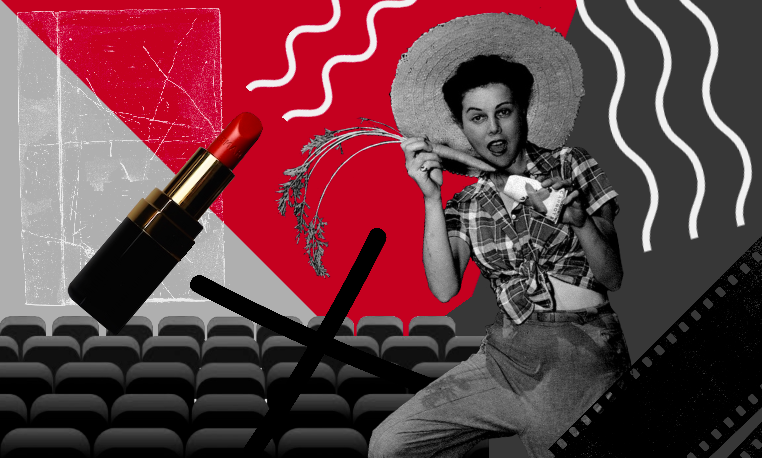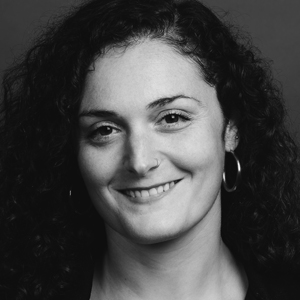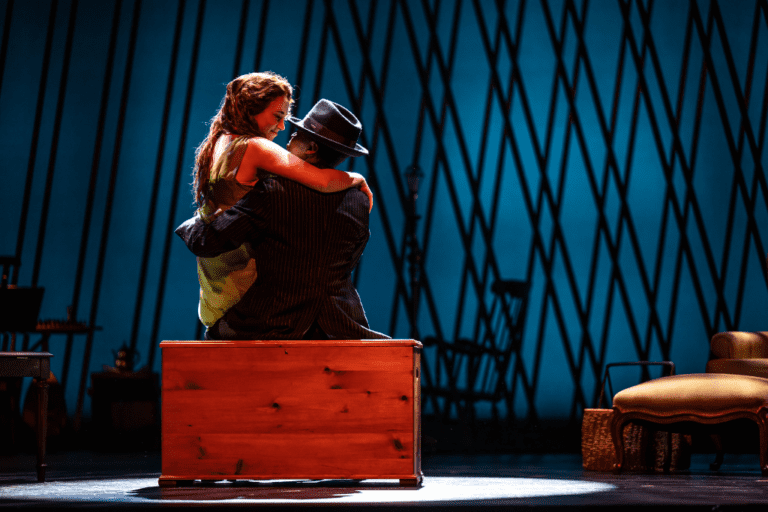Theatre These Days
My grandmother always wore the classic red Chanel lipstick. I have very few memories of her without it. Even in black and white photos, you somehow know that her lips are the colour of flames. It was never formal. It was just… how she looked.
I don’t wear Chanel; I wear MAC. Although these days, of course, I don’t. I have nowhere to wear it—I could wear it under my mask, but that seems like a mishap in the making. I haven’t worn red lipstick since March. Red lipstick, for me, has always meant fancy: theatre openings, closings, galas, award shows—this year, I had to watch the Montreal English Theatre Awards from my couch and the only red I sported was a moth-eaten wool sweater. Besides, I can’t even be bothered to shower most days, let alone wear makeup, let alone red lipstick. It would feel like that scene in Rear Window when Miss Lonelyhearts gets all dolled up and sets the table for two and then sits there eating with her imaginary date. Cut to me, not-so pearly whites set between MAC Viva Glam 1, sitting in front of my laptop, watching mediocre television.
Yes, for the past four months, I’ve been bingeing Bones. For those not familiar with the TV show, it’s about a forensic anthropologist who solves crimes. It aired on Fox from 2005 to 2017 and stars the lesser-known Deschanel sister, Emily. When I confided in a friend what I’ve been doing with my time, she asked, barely masking her disdain, “Bones? Oh God, why?” I told her, “Because they solve the mystery at the end of the episode.” There is comfort in that certainty. In knowing that no matter how gruesome things get, how many tibias and fibulas pop up in the Potomac, the problem will be solved. That is a balm in these times.
It also doesn’t hurt that Bones has 12 seasons and a whopping 245 episodes. Which means that unlike my friends, my family, and my fellow artists whom I am no longer allowed to see, at the end of each 44-minute instalment, these characters will not have to leave me; until I decide otherwise, they will stay. And will be there tomorrow and tomorrow and tomorrow; forever, actually, since, once I’ve finished all 180 hours, I’m free to start back at the pilot, if I so choose.
I am dedicated to my seemingly endless stream of murder, mayhem, and questionable couplings. I won’t even switch it up with a movie. Because I know that at the end of those 90-120 minutes, the characters to whom I have grown attached will disappear, as fictional characters are wont to do. But I don’t know that I can bear to have more people—even made-up ones—leave my day-to-day life.
I am aware that, instead of Bones, I should be watching anything and everything happening in theatre, and so, occasionally, to make my friends happy, I will allow myself to be dragged away from my laptop television. When you’re the “theatre practitioner friend,” this is what is expected of you. They take me to the rare live show and I sit there and mourn. I do not see the brightness. I do not see what is there. I see the spaces in between, the missing props and actors.
All the world’s a stage except for the literal stages. How ironic.
I wasn’t always this wet blanket. I was actually one of the initial creators of live, pandemic-friendly theatre in Canada. I was excited by the challenge. To bring a multitude of actors together, safely, and create something transportive for a live audience. Working with the given restrictions to create something outside the traditional confines. I am a theatre maker, after all; I have been trained to be resilient and adaptable. Not to let a “no” get me down. Didn’t get the part? Write your own! No one to produce your show? Do it yourself! Because of this mentality, when the theatres all closed, it was like the community became a listicle of “15 Ways to Not Become Obsolete as a Theatre Artist During This Pandemic.” Anyone feeling sorry for themselves clearly wasn’t trying hard enough to reimagine what could be. Theatre was like the eponymous character from the 1989 classic Weekend at Bernie’s and if we could just keep dressing up the body, no one would realize that it was actually a corpse. Maybe that’s why I’m drawn to Bones; because it never pretends that a cadaver is anything else.
So I jumped on board. I have always heralded site-specific theatre as innovative. I ran a site-specific festival for years. My own shows are primarily site-specific. But now, this art is site-specific out of necessity, not out of innovation. And, in truth, it isn’t even site-specific. It’s just outdoors. But we call it site-specific to make ourselves feel like a deliberate choice has been made, when in reality, we have very little say in the matter.
I was optimistic for so many months. I felt like Henry V on Saint Crispin’s Day—charging on, despite adversity, making theatre. But looking back, maybe I was only Don Quixote, tilting at windmills.
The trouble is, I do not know what it means to be anything other than what I am. And by that, I mean that I do not know how it feels to not be an actor, a playwright. I do not know what it means to not put myself—my whole self—into everything that I make; in every penny that I earn. Not that we have pennies anymore, but it’s an expression, like “all the world’s a stage”; although in the latter’s case, it both is and isn’t right now. All the world’s a stage except for the literal stages. How ironic.
When I was still in theatre school, my grandmother was taken to hospital by ambulance. While my aunt was visiting, my grandmother’s skin had turned yellow. As they waited for the ambulance to arrive, my grandmother pulled out her tube of classic red Chanel and started applying it. My aunt, horrified, asked my grandmother what on earth she was doing. My grandmother replied, “Just because I can’t breathe, doesn’t mean I have to look like a mess.”
They say not to place all your self-worth in your work, but theatre is not just my livelihood. It is my hobby, my community. It is the only thing that I have ever really had to be accountable to and for. The idea of writing a play to be streamed online, though, all the actors in their separate houses like some macabre version of Hollywood Squares, makes me shudder. But the alternative is also grim. To just give up—and not because I have found a passion for something new, but because, without theatre, I have been rendered passionless. Theatre is what guides me and drives me forward. It has created the framework for everything else in my life. And now that that framework has crumbled, or rather, been dissolved, I am left to find that everything remaining lacks luster.
What I wouldn’t give for awkward small talk at an opening night—the shitty wine, the table full of appetizers that I’m allergic to.
What I wouldn’t give to have to force a smile at a gala for that director I never heard back from or that patron with uncomfortably strong opinions about my show. These days, there is no one for whom I need to even pretend.
What I wouldn’t give for red lipstick. Mine, not my grandmother’s. Though, of course, I miss hers too.
It felt liberating. To stop trying to adapt. To just let go. But, of course, it also feels like a betrayal.
I see the optimists on Instagram, promoting their adjusted theatrical endeavours. I did it myself, back in the day—which is to say September—“for in a minute there are many days,” these days. I reworked a show and rehearsed it on Zoom and presented it for a live audience, outdoors, on the steps of a real theatre, which was as close as we were going to get and that was fine, that was enough, and we got two performances in before the city went into Zone Red and shut down. It’s funny how you can expect something to happen and still be crushed by it.
A month later, I wrote a screenplay. Just a short, but still. It’s about a woman who becomes convinced that her chicken can solve crimes. I got a grant to shoot it and everything. I wrote it because I needed to write; I needed people to write for. And with film, I can keep everyone safe, come what may. I can ensure that my actors are never even in the same room, if that’s what it takes, and edit it so you’d never know. I can fix it in post. I can make you believe that everything is normal again.
I never imagined a stage. Not once. I saw each shot so clearly in my mind, freed from the constraints of a black box or proscenium, from scrims and backdrops and ersatz houses. It felt liberating. To stop trying to adapt. To just let go. But, of course, it also feels like a betrayal. Like the final acknowledgement that theatre as I know and love it—that is to say, live, and for an audience occupying the same space as the performers—is on life support and will likely not recover for years.
My grandmother grew up in Connecticut. She was in Summer Stock there. Katharine Hepburn and Spencer Tracy saw her perform. But it wasn’t a respectable undertaking for a “decent” young woman and so she went into the family’s lamp business. She came to Montreal to scout out the competition: my grandfather. And they begat my father who, many years later, begat me. She died a few weeks after that famous ambulance ride, so she never got to see me onstage really, apart from my uncanny portrayal of Golde in my high school production of Fiddler on the Roof. She doesn’t know who I have become; I hope she would be proud. I don’t think that she would look kindly on me bingeing Bones, though. Or maybe she would understand. But she would probably tell me to at least get dressed and put on some mascara.

I hit a huge milestone recently; my collaborators and I handed in the first completed draft of a new musical to our producers. We’re still working under the notion that it will make it to the stage—a real one, indoors, with an audience seated in velvet seats. I don’t know if that’s delusion or hope. We’ve talked about the likelihood that we won’t be able to be onstage until 2022… at the earliest. We’ve talked about what it would look like to reshape this show as a film. I was completely against it at first but, like all things I was resistant to at the start of this pandemic, I’ve acclimatized to the idea. Still, this show was meant for stage, not screen. I suppose that just the act of planning for theatre makes it an act of hope—albeit a very prolonged one.
After our big submission to the producers in December, we toasted on Zoom. It is strange to be unable to properly acknowledge huge life events these days. It makes closure unattainable. I didn’t have anything to toast with, so I stole some of my roommate’s vodka and added water and organic unsweetened cranberry juice and tried to pretend that I was at a cocktail club. Although truth be told, my capacity for make-believe has been greatly reduced lately. I put on a toque to look less dishevelled. What I really wanted was to put on red lipstick. But that act of dressing up, it would have meant acknowledging what has been lost.









Comments